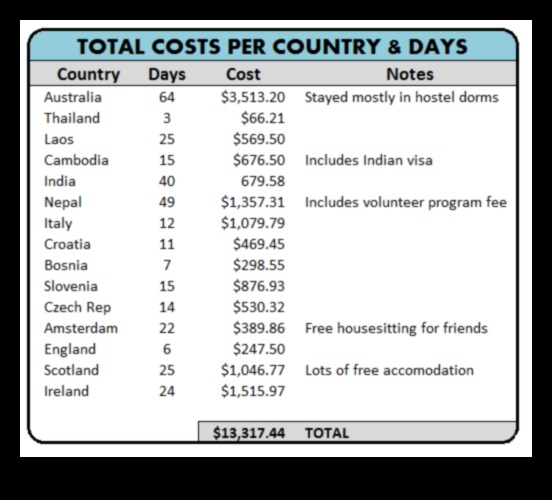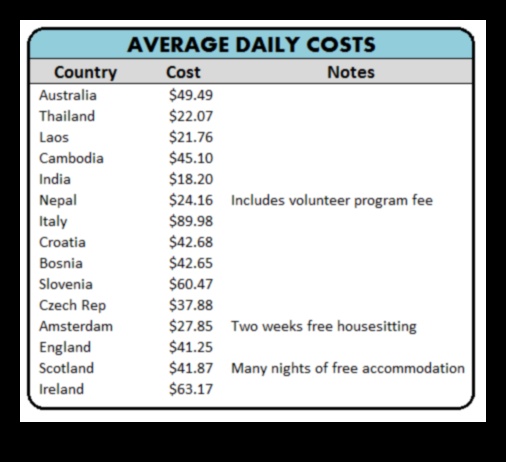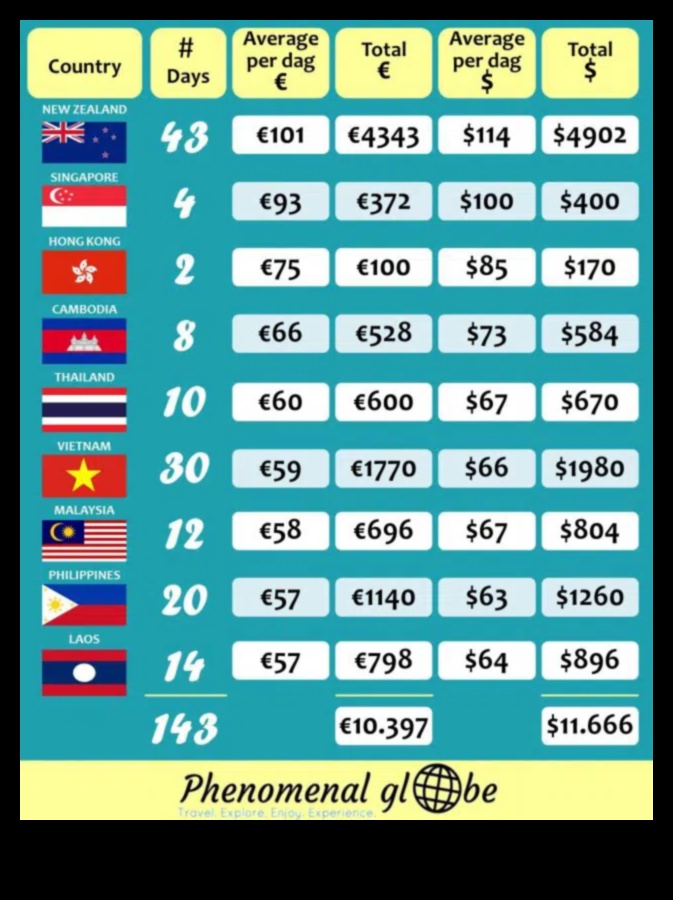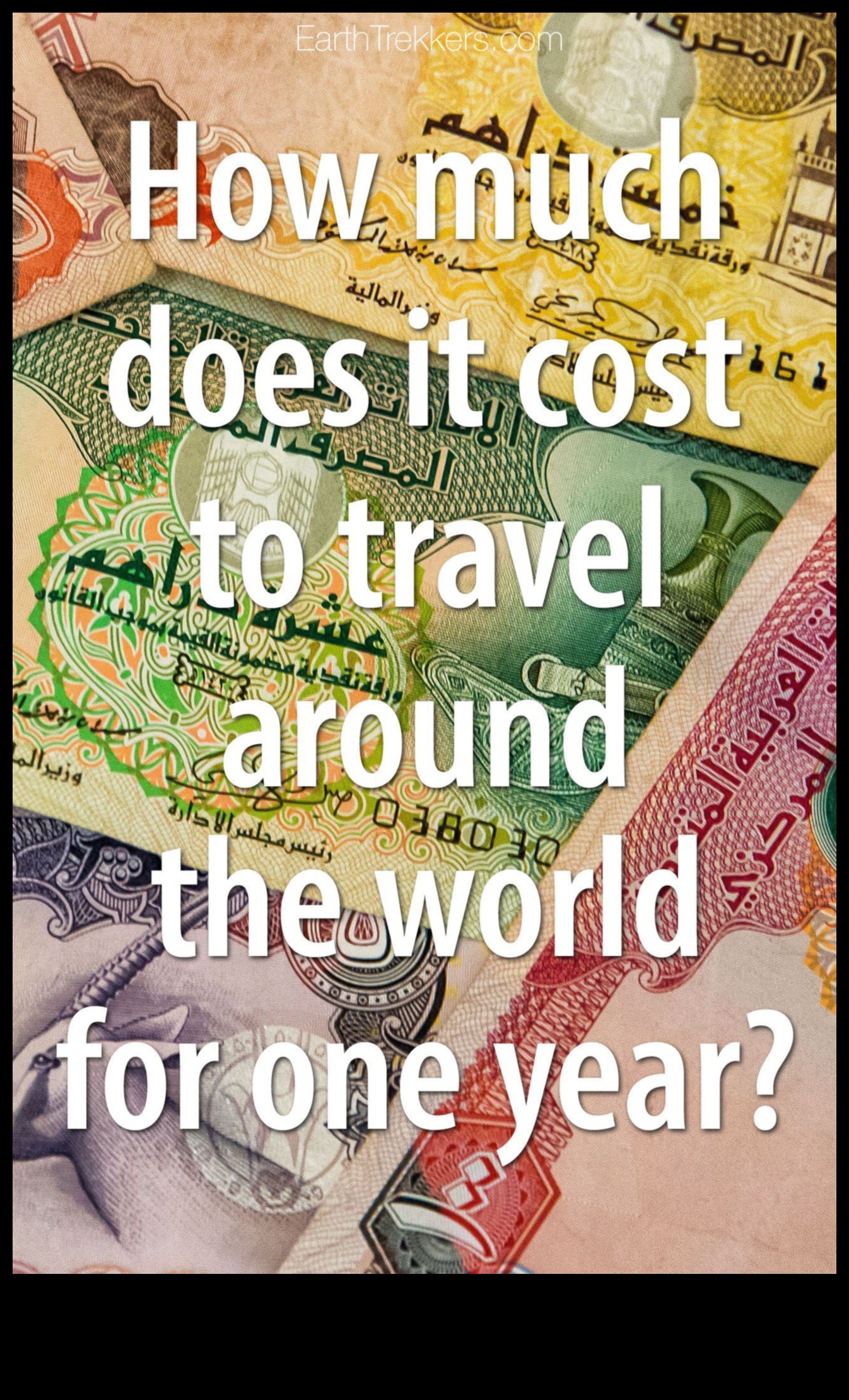
How Much Money Do You Need to Quit Your Job and Travel?
This is a common question among people who are considering quitting their job to travel the world. There is no one-size-fits-all answer to this question, as the amount of money you need will depend on your individual circumstances. However, there are a few factors you can consider to help you estimate how much money you need to save up.
1. The length of your trip
The longer you plan to travel, the more money you will need to save. This is because you will need to cover the cost of food, accommodation, transportation, activities, and other expenses for a longer period of time.
2. The destinations you plan to visit
The cost of travel will vary depending on the destinations you plan to visit. Some countries are more expensive to travel to than others, so you will need to factor this into your budget.
3. Your travel style
The way you travel will also affect the cost of your trip. If you plan to stay in hostels and cook your own food, you will be able to save money. However, if you plan to stay in hotels and eat out at restaurants, your trip will be more expensive.
4. Your budget
The final factor to consider is your budget. How much money can you realistically afford to save up? Once you know your budget, you can start to create a travel plan that fits your needs and financial constraints.
How much money do you need to quit your job and travel?
There is no one-size-fits-all answer to this question, but a good rule of thumb is to save up at least six months of living expenses. This will give you a cushion in case of unexpected expenses, and it will also allow you to enjoy your trip without having to worry about money.
Of course, you may need to save up more or less money depending on your individual circumstances. If you are planning to travel for a long period of time, or if you are planning to visit expensive destinations, you will need to save up more money. However, if you are planning to travel for a shorter period of time, or if you are planning to visit less expensive destinations, you may be able to get by with saving up less money.
Ultimately, the decision of how much money you need to save up is a personal one. You need to decide what is the right amount of money for you to save up in order to quit your job and travel the world.
| Feature | Answer |
|---|---|
| Cost of living | The cost of living varies greatly from country to country. In general, you can expect to spend around $500-$1,000 per month on food, accommodation, transportation, and activities. |
| Early retirement | The amount of money you need to save for early retirement depends on your desired lifestyle and retirement age. In general, you should aim to have saved up at least 25 times your annual salary by the time you retire. |
| Financial independence | Financial independence is achieved when you have enough passive income to cover your living expenses. The amount of money you need to reach financial independence depends on your desired lifestyle and annual expenses. |
| Travel budget | The cost of your travel budget will depend on the length of your trip, the countries you visit, and your travel style. In general, you can expect to spend around $50-$100 per day on food, accommodation, transportation, and activities. |
| Travel hacking | Travel hacking is a way to save money on travel by using credit card rewards and other strategies. There are many different ways to travel hack, and you can save a significant amount of money on your next trip. |

II. The Cost of Airfare
The cost of airfare is one of the biggest factors to consider when planning a trip. The average cost of a round-trip flight from the United States to Europe is around $1,000, but it can vary significantly depending on the time of year, the airline you choose, and the airport you fly from.
There are a few ways to save money on airfare. One way is to book your flight in advance. Airlines typically release their cheapest fares 3-6 months in advance, so if you can plan your trip far enough in advance, you can often get a good deal.
Another way to save money on airfare is to fly on a budget airline. Budget airlines typically offer lower fares than traditional airlines, but they often have fewer amenities and less legroom.
Finally, you can also save money on airfare by flying into a smaller airport. Smaller airports often have less competition, which means that you can often find cheaper flights.
Here are some tips for finding cheap airfare:
- Book your flight in advance.
- Fly on a budget airline.
- Fly into a smaller airport.
- Consider flying during the off-season.
- Use a travel agent or fare finder to compare prices.
III. The Cost of Airfare
The cost of airfare is one of the biggest factors to consider when planning a trip. The average cost of a round-trip flight from the United States to Europe is around $1,000, but prices can vary depending on the time of year, the airline you choose, and the airport you fly into.
If you’re looking to save money on airfare, there are a few things you can do. First, try to book your flight in advance. Airlines often offer discounts for flights that are booked more than 30 days in advance. Second, consider flying into a smaller airport. Flights into smaller airports are often cheaper than flights into major hubs. Finally, be flexible with your travel dates. Flying during off-peak times can save you a significant amount of money.
Here are some tips for finding cheap airfare:
- Use a flight search engine like Kayak or Skyscanner to compare prices from different airlines.
- Sign up for email alerts from airlines and travel websites. You’ll be notified when there are special deals or discounts available.
- Consider using a travel agent. Travel agents can often find cheaper airfare than you can find on your own.
IV. The Cost of Food
The cost of food can vary significantly depending on where you are traveling. In general, you can expect to spend between $10 and $30 per day on food. However, there are ways to save money on food, such as cooking your own meals, eating at local restaurants, and taking advantage of free food samples.
Here are some tips for saving money on food while traveling:
- Cook your own meals. This is the easiest way to save money on food. You can buy groceries at local markets or supermarkets and cook your own meals in your hotel room or hostel.
- Eat at local restaurants. Local restaurants are often much cheaper than tourist restaurants. You can find delicious food for a fraction of the price at a local restaurant.
- Take advantage of free food samples. Many restaurants and cafes offer free food samples. This is a great way to try new foods and save money on your meal.
By following these tips, you can save money on food and enjoy your trip without breaking the bank.

V. The Cost of Transportation
The cost of transportation can vary significantly depending on how you plan to travel. If you are planning to fly, the cost will depend on the destination you are flying to, the time of year you are traveling, and the airline you are flying with. If you are planning to travel by train, the cost will depend on the distance you are traveling and the type of train you are taking. If you are planning to travel by bus, the cost will depend on the distance you are traveling and the type of bus you are taking.
Here is a table that provides a general overview of the cost of transportation for different modes of travel:
| Mode of Transportation | Cost |
|---|---|
| Airfare | $200 – $1,000+ |
| Train | $50 – $500+ |
| Bus | $20 – $200+ |
It is important to note that these are just estimates and the actual cost of transportation will vary depending on your specific circumstances.

How Much Money Do You Need to Quit Your Job and Travel?
The amount of money you need to quit your job and travel depends on a number of factors, including your desired travel style, the length of your trip, and the countries you plan to visit. However, a good rule of thumb is to have at least $50,000 saved up before you quit your job. This will give you enough money to cover your basic expenses for a year, such as food, lodging, transportation, and activities.
If you are on a tight budget, you can reduce your travel costs by staying in hostels, cooking your own meals, and using public transportation. You can also extend the length of your trip by working part-time or volunteering in exchange for room and board.
Here is a breakdown of the average cost of travel per month, based on a survey of 100 solo travelers:
- Accommodation: $500
- Food: $250
- Transportation: $150
- Activities: $100
- Other expenses: $50
Of course, these are just estimates, and your actual costs will vary depending on your travel style and the countries you visit. But this should give you a good idea of how much money you need to save up in order to quit your job and travel the world.

VII. The Cost of Visas and Passports
The cost of visas and passports can vary depending on the country you are visiting. For example, a tourist visa for the United States costs $160, while a tourist visa for India costs $100. You can also expect to pay a processing fee for your passport, which typically costs around $100.
It is important to factor in the cost of visas and passports when planning your budget for a long-term trip. If you are planning on visiting multiple countries, you may need to get multiple visas, which can add up in cost.
You can also save money on visas by applying for them in advance. Many countries offer online visa applications, which can be completed and submitted from the comfort of your own home.
Here are some tips for saving money on visas and passports:
- Apply for visas in advance.
- Compare prices between different visa providers.
- Consider getting a multiple-entry visa if you are planning on visiting multiple countries.
- Check if your country offers a visa waiver program for certain countries.
The Cost of Insurance
Insurance is an important part of any travel budget, as it can help to protect you from unexpected costs. There are a number of different types of insurance that you may need to consider, including:
Travel insurance: This type of insurance covers medical expenses, trip cancellation, lost luggage, and other unexpected costs that can arise while you are traveling.
Medical insurance: If you are from a country with socialized healthcare, you may not need to purchase medical insurance for your trip. However, if you are from a country with a private healthcare system, you may want to consider purchasing medical insurance to cover any unexpected medical expenses.
Rental car insurance: If you are renting a car during your trip, you will need to purchase rental car insurance. This type of insurance covers damage to the rental car and liability in the event of an accident.
Baggage insurance: This type of insurance covers lost or stolen luggage.
Evacuation insurance: This type of insurance covers the cost of evacuating you from a dangerous situation, such as a natural disaster or civil unrest.
The cost of insurance will vary depending on the type of insurance you purchase, the length of your trip, and your age and health status. You can get quotes from different insurance companies to compare prices and coverage options.
IX. The Cost of Emergencies
When you are traveling, it is important to be prepared for emergencies. This means having enough money saved up to cover unexpected expenses, such as medical bills, lost luggage, or stolen passports.
The amount of money you need to save for emergencies will vary depending on your travel plans. If you are planning on traveling to a developed country, you may not need to save as much money as if you are planning on traveling to a developing country.
Here are some tips for saving money for emergencies while you are traveling:
- Create a budget and stick to it.
- Avoid unnecessary spending.
- Consider getting travel insurance.
- Save up an emergency fund before you travel.
By following these tips, you can help to ensure that you are prepared for any emergencies that may arise while you are traveling.
FAQ
Q: How much money do I need to save up to quit my job and travel?
A: The amount of money you need to save up to quit your job and travel will vary depending on your individual circumstances. Some factors to consider include the length of your trip, the destinations you plan to visit, and your desired travel style.
Q: What are the best ways to save money for a trip?
A: There are many ways to save money for a trip, including:
- Cutting back on expenses
- Getting a part-time job
- Starting a side hustle
- Investing your money
- Using travel hacking
Q: What are some tips for budgeting for a trip?
A: There are a few things you can do to budget for a trip, including:
- Create a travel budget
- Track your spending
- Set savings goals
- Be flexible with your budget